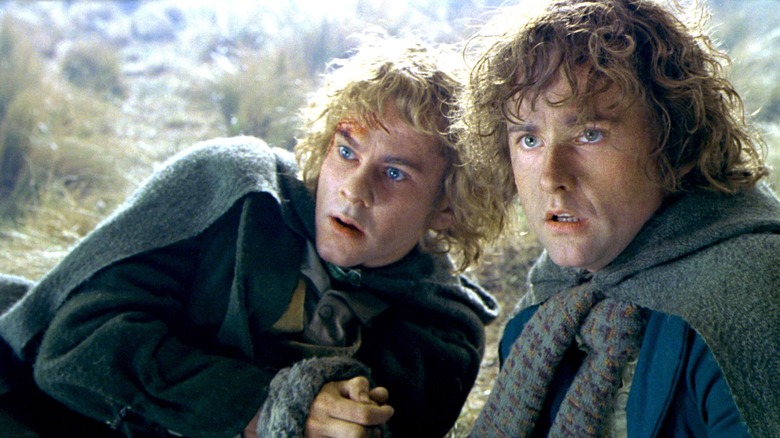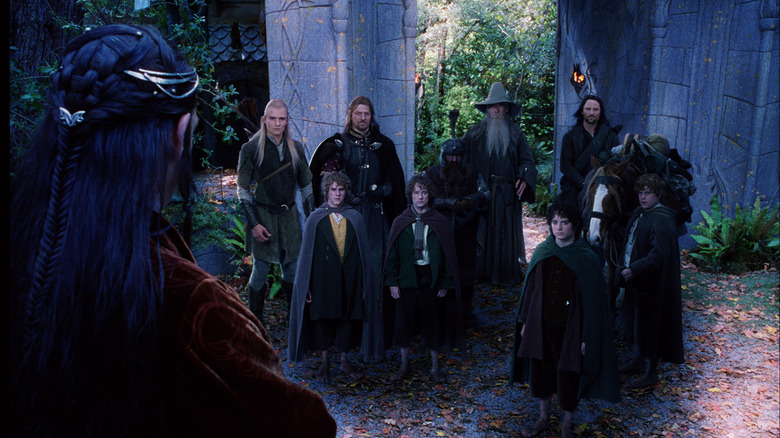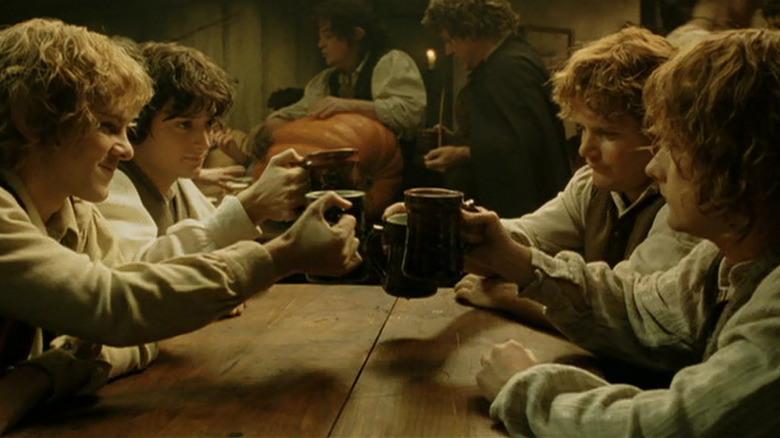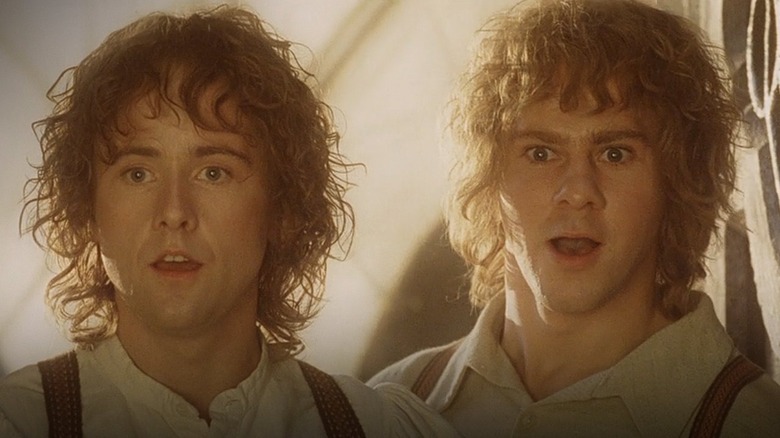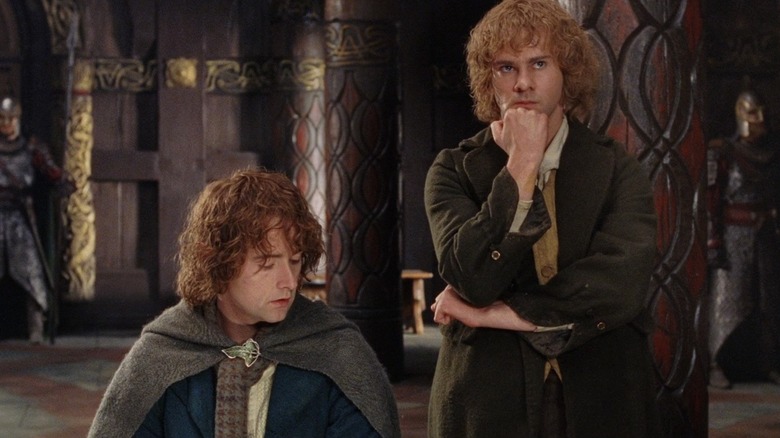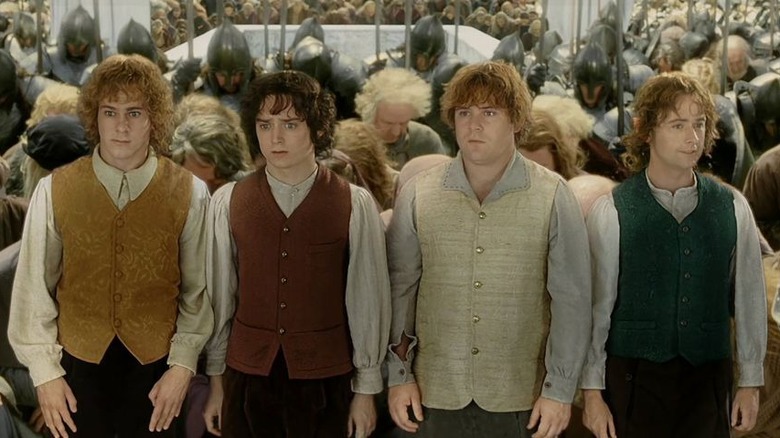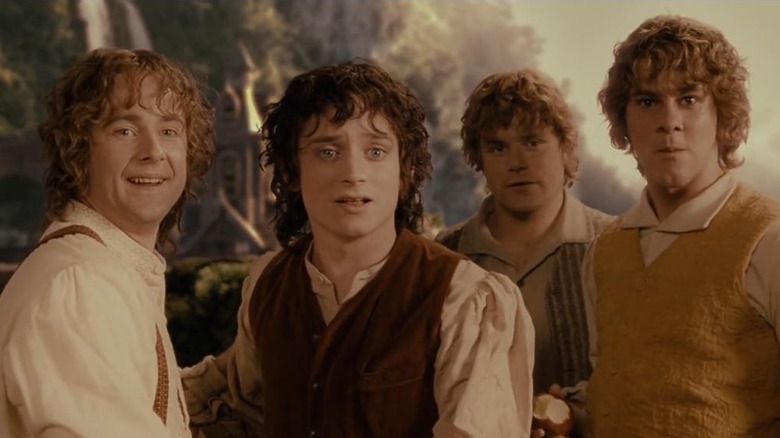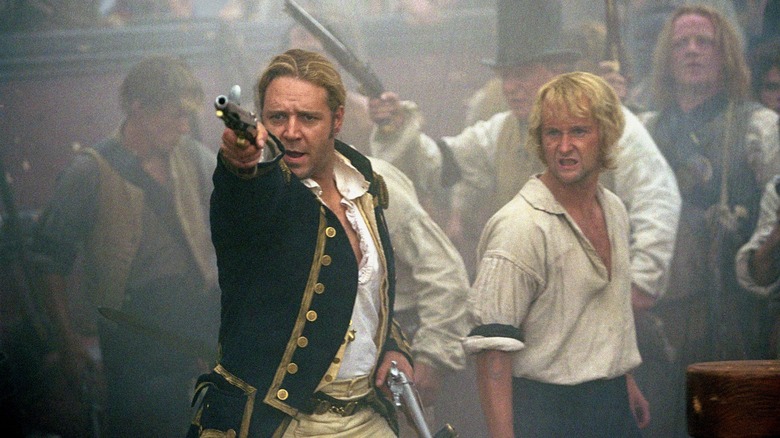Dominic Monaghan And Billy Boyd Talk Comic-Con Memories, Advice For The Rings Of Power Cast, And More [Exclusive]
From page to screen, Peter Jackson's "The Lord of the Rings," his prequel follow-up trilogy "The Hobbit," and now Prime Video's upcoming "The Lord of the Rings: The Rings of Power" series all represent the lasting legacy of Tolkien's vivid imagination ... one buoyed, in no small part, by the pitch-perfect cast of stars (and, at the time, stars in the making) who played invaluable roles in bringing such unforgettable characters to life.
But even amid high drama and operatic feats, audiences gravitated towards two of the unlikeliest of heroes. It was hard to mistake Elijah Wood's Frodo Baggins and Sean Astin's Samwise Gamgee as anything other than the heart and soul of "The Lord of the Rings," but Dominic Monaghan as Meriadoc "Merry" Brandybuck and Billy Boyd as Peregrin "Pippin" Took easily embodied the lifeblood of courage and humor running through the story's veins. This week, I was fortunate enough to talk to Monaghan and Boyd, both of whom have traded in their cloaks and swords for a microphone with their ongoing "The Friendship Onion" podcast series.
With San Diego Comic-Con in full swing and set to deliver a highly-anticipated "Rings of Power" panel, the actors were gracious enough to indulge my questions about their own Comic-Con memories (both the good and the bad), the lasting legacy of "The Lord of the Rings," the state of fandom these days, and, most importantly, whether "Master and Commander: The Far Side of the World" will ever receive a sequel.
'The Lord of the Rings will always be a huge part of our lives'
One thing I really appreciate about your podcast is how it's not necessarily "The Lord of the Rings"-focused. Obviously, you guys have your trivia games, you answer fan questions about the trilogy, and you're super cool about it all. But did you make a conscious choice not to make it specifically focused on "The Lord the Rings" all the time, so you could talk about your other passions?
Boyd: Yeah, actually it was. Well, I think both of us think this way, but I don't want to speak for Dom on it.
Monaghan: No, please.
Boyd: [Laughs] I feel like sometimes things are getting very specific in everything, but certainly in podcasting. It's like, this podcast is specifically this tiny little thing, and life isn't like that. Dom and I have a lot of interest and passions and obviously "The Lord of the Rings" will always be a huge part of our lives. It's how we met and how our friendship started and it's always going to be part of the podcast.
But also, today we had a retro gamer on because we're getting into video games again and talking about the old video games, or we'll be talking to an astronaut because we're talking about space one week. It can be anything, and I think it's wrong to narrow things down. And hopefully the audience will stay with us as we explore lots of interests and passions.
Monaghan: Yeah. I think it does potentially get a little limited if we're only talking about "The Lord of the Rings," but we invariably will here and there.
The other thing is that I think one of the major things that Billy and I agreed on when we were trying to put together the show was we wanted it to feel for the audience as if they are kind of eavesdropping on a couple of friends in a pub or sat around just having a chat about nothing in particular, so that in that hour you can just relax, take it easy, have a cup of tea, not worry about what's happened or what's going to happen ... we wanted it to feel casual. We wanted it to feel like it could go anywhere, and hopefully that's what we're continuing to achieve as a vibe.
'All four of us together'
Here's a much broader question for you guys: It's been over 20 years since "The Fellowship of the Ring" debuted. What's life after "The Lord of the Rings" been like?
Monaghan: Wow. I mean, what's the last 20 years of our life like? I think, certainly if you're looking at it from a career point of view, you can kind of plot your career on, "This was what I was doing as an actor pre-'The Lord of the Rings,' and then this was what was happening post-'The Lord of the Rings,'" because obviously it's an extremely influential project in our lives as actors. But I think we're still doing the same things, still exploring the same thing as actors: Trying to do different things, looking for characters that are well-rounded and interesting and maybe different from something that we've played before. You could argue that maybe we have had more opportunities since "The Lord the Rings," but as actors, I still think we approach our lives and our careers in the same way.
Like you said, you've both been acting consistently in the years since then. But it's not like "The Lord the Rings" was a part of your life and then you just sort of moved on from that, put that in the past. For example, I believe you two met up recently with Sean Astin and Elijah Wood?
Boyd: These comic conventions that in 20 years since we've made the movies, we've never done one together, all four of us, and met the fans and said hello and stuff. Someone came to us and had that idea to do a sort of Hobbit get-together and do a show. It's been really fun so we're doing six of them this year, different cities — Toronto, Boston, Dallas — and it's been great. Dom had the idea, which is maybe his only ever good idea...
Monaghan: Thank you.
Boyd: ... that we always meet up on the Friday before the Saturday show and have dinner somewhere really nice in that city. We've just been kind of catching up. And obviously I see Dom every week because of the podcast. I see Elijah, I see Sean, but all four of us together is something we haven't done for a long time. It's been truly wonderful. It's been great.
'That fandom has become the most fervent, the most passionate'
Folks always say that there'll never be another event like "The Lord of the Rings." Maybe to a certain extent that's true, especially for you, where that was such a vital part of your lives. Without pitting one thing against the other or anything, do you think that's true? Do you think there's any way that this new show can live up to what you guys did?
Boyd: I think it was a very certain time and everything came together just right. And it was made in New Zealand — we weren't part of the sort of Hollywood studio. We didn't finish work and then hang around Hollywood. We were all in New Zealand for the whole time. We had no idea what anyone was saying about it. We were basically the Fellowship in New Zealand living this adventure. And then we were lucky enough that when it was released, it became very big very quickly. Then we were on this weird sort of conveyor belt of going from one country to another and seeing that it was as big in Tokyo as it was in Berlin as it was in London.
What is that tipping point in anything? Who knows? I mean, maybe something else can get [to that level], but it was sort of just a combination of a filmmaker at the top of his game, technology catching up so that it could look real, some of the greatest actors in the world, like Dominic Monaghan here on my right –
Monaghan: And some really average ones as well.
Boyd: [Laughs] So I don't know. I mean, how can you ever say?
Monaghan: Yeah, it's hard to predict what catches fire. I remember doing a film with Sean Bean after we did "The Lord of the Rings." We were sat in this forest in Ukraine and he said [exaggerated Yorkshire accent], "Why, I did this really great TV show a couple years ago that you'd really like. It was called "Game of Thrones." [Laughs] Yeah, and he didn't know. He didn't know it was going to turn into a phenomenon ... I think with "The Lord of the Rings" trilogy and everything surrounding it, in a lot of ways that fandom has become the most fervent, the most passionate. They're the biggest fandom and no one can compute something being bigger, but over the course of time, something will come along that will be bigger, but it won't diminish what happened with that Peter Jackson trilogy, because it's an extraordinary piece of work.
'Everyone else's opinion doesn't really matter'
Dominic, I know you're not on Twitter as much anymore as you used to be and I'm sure part of the reason was just the general tone and the negativity on the platform. Now, I'm wondering with "The Lord of the Rings: The Rings of Power," this new cast, they're going to be jumping headfirst into that cauldron, so to speak. What are your thoughts on fandom these days? Have you noticed that they're maybe a little more fractured these days, a little more vitriolic?
Monaghan: Yeah. I mean, it's easy for people to be critical when they're hiding behind an anonymous call sign. I think if you have a certain amount of followers, there will be someone disagreeing with something that is clearly true. You could say, "It was a wonderful sunny day in Los Angeles today," and someone would write, "It rained where I was," because there's going to be those type of people. I think you can always find contrary points of view. My Instagram feeds to my Twitter, but I'm not on Twitter that much simply because of what you said. I found that the Twitter community can be a little bit like a gossipy classroom. Just a lot of like useless chatter and a little bit of negativity, whereas Instagram can be, if you want, just posting up videos and photos and then you can just leave it as it is.
I think if social media was around when the Peter Jackson trilogy came about, then maybe Billy and I and all the rest of the cast would've been on the receiving end of however people feel about those movies. Luckily we weren't. My only advice that I would give to any cast members making "The Lord of the Rings" Amazon show now is, if you're having great days on set and you've made great friends and you love the crew and you love the job that you did, don't worry about the rest of it. You are working on an amazing job in that case, because if you can go to work and enjoy yourself, everyone else's opinion doesn't really matter. You're going to have people obsessed about "The Lord of the Rings" that are going to rip this project into pieces simply because they want to make a name for themselves. So, just kind of enjoy your job.
'I didn't really know what we were walking into'
With San Diego Comic-Con underway, does that bring to mind any memories for both of you from when you visited as a member of "The Lord of the Rings" cast back in the day?
Boyd: Do you know, I think I've only ever been to San Diego Comic-Con once.
Monaghan: Really?
Boyd: Yeah, I think so. It was during, I think, maybe the third movie, "The Return of the King." I remember David Wenham [who played Faramir] being there. I think it was the third movie. It was crazy, just great fun. I mean, all these conventions have morphed into something new. San Diego Comic-Con's slightly different because obviously studios can use it and companies can use it to advertise and pitch things, but they used to be comic conventions. Those people who like comic books and now it's much more family-based, people dressing up and much more of a carnival, much more a fun place to be. I think they're great weekends and people use them now as vacations. They're wonderful. I think they're great.
Monaghan: Lots of TV and movie stuff there, whereas I think when we were there with "Rings," I going there with "Fellowship" and we were one of the initial first big movies to go to this, like Billy said, at that point, comic book convention. I remember being kind of in the wings with Elijah [Wood[ and Liv [Tyler], Pete Jackson, Orlando [Bloom], maybe, but I remember Pete kind of being giggly and quite excited and stuff and said, "Oh, this is going to be crazy. This is going to be crazy."
I didn't really know what we were walking into. Then we were in a room where they showed a little bit of footage and then Elijah and I wanted to go on the shop floor. The only way that we could do that was to wear Stormtrooper helmets and walk around. But it was huge and full of people. There's a couple times where one of us would take our helmet off to say one thing to the other, and then just kind of invaded and surrounded by people.
It's a great weekend for a lot of people and similar to the conventions that Billy and I have been on with Sean and Elijah. The thing that I love about it is this might be one of the only weekends in the year where people get a chance to wear what they want, dress however they want, say what they want, talk about their fandom without any fear of judgment. It's a weekend of acceptance, and I think that's a really positive thing.
'This is something that will never happen again in your career'
Are you glad those Comic-Con days are behind you? Or do you catch yourself thinking about them on a rainy day?
Boyd: I don't yearn after those days, but I didn't dislike them. I mean, always those things are more glamorous for people looking from the outside in. If you think of the premiere to when we were going from L.A. to New York, New York to London, that was night after night. We would finish in New York, say, on a Monday, get on a flight Tuesday morning, go to London, do press all day, and then the next day do the premiere, which was just a red carpet. You'd have to go to the party afterwards because you had to say hello to whoever was there in London.
Monaghan: Tired, jet lag.
Boyd: And then the next morning you'd go on a flight again ... there were times by the end of it, we would sit in the theater when the movie was on and as soon as it started, we'd leave, get out of our suits, go to bed while the movie was on just to get three hours sleep. And then put our suits back on to go to the party, because you had to meet whoever the executives were from whatever studio and then on a flight again the next day to the next. There's no real glamor to it. Although obviously it's super fun. And something you look back on and think, "Wow, that was weird and wonderful."
Monaghan: But like Billy said, I mean that premiere run, I don't think you would do that many times in your career. Typically, it would be L.A., New York, London, Paris, Berlin, Tokyo, Sydney. Wellington. By the end of that, I distinctly remember waking up in hotel rooms and having no idea where I was. I would have to look at the information on the phone to realize, "Oh, that's right. I'm in Australia. Okay, great. I'm in Australia." I think, "Right. Is it 3:00 in the morning or is it 3:00 in the afternoon? If it's 3:00 in the afternoon, then I have to be somewhere in an hour and a half." [laughs]
Of course, it's fun and you're with your mates and you're all dressed up and you're having fun and stuff, but I'm the same. I don't necessarily miss it, but I remember it fondly. But it might be kind of a unique experience, "The Lord of the Rings." I mean, even Peter Jackson, who obviously has had an incredible career and continues to do extraordinary things, even he at the time said, "I'll never do a film like this again." He knew it and I think we were so young that we didn't know it, but he was quick to tell us, "This is something that will never happen again in your career."
Boyd: Even Christopher Lee said, didn't he? And he, I think, is in the Guinness Book of Records for having done the most movies of any actor. He said he'd never been on a movie like "The Lord of the Rings."
'Well, it's a massacre in there, isn't it?'
Billy, I'd be remiss if I didn't ask: What's the status on a sequel for "Master and Commander?"
Monaghan: Yeah, what's Russell [Crowe] up to?
Boyd: Yeah, that's a sort of a "The Lord of the Rings" story as well actually, because it was released the same year as "The Return of the King." I think that was the big problem, was "The Return of the King" was the movie that year.
I was lucky enough to be at the Oscars that year with Dominic here. I went to the restroom at one point and Peter Weir was in the restroom, the director of "Master and Commander." He was standing at a urinal having a pee and he turned around and he saw me and he said, "Well, it's a massacre in there, isn't it?" [Laughs] I thought, "Well, any other year and 'Master and Commander' would've..." And I think "Master and Commander" was also a slow burn in terms of making money and obviously big studio movies like that have to make money. It was an expensive film ... entirely on the sea, which makes things much more expensive.
Monaghan: A bunch of books, right? How many books?
Boyd: Like 27 books!
Monaghan: Can you imagine being in 27 movies?
Boyd: Peter Weir said to me, I remember we were making it, he said, "You'll make it through the next one, but we're going to kill you in the third one."
Monaghan: Fine. I'll take the money and run.
Boyd: But yeah, of course they should definitely make another one. I think it's an unusual film to be that expensive, but allowed to be the film that it was, which was historical and truthful. Peter Weir is a master storyteller.
Monaghan: And for a big blockbuster like it was with big stars like Billy Boyd, some lovely moments of stillness in there, on the ship with the tying of the knots or little moments with nature. Yeah, looking at the ocean and how it's behaving. Great film, loved it.
